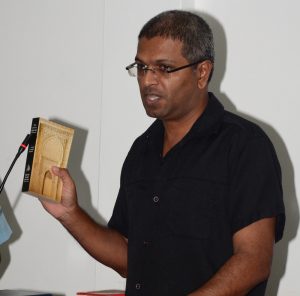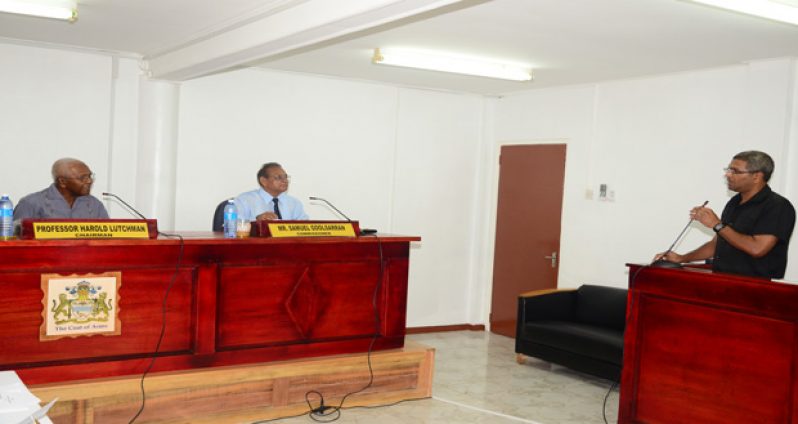PERMANENT Secretary in the Ministry of the Presidency, Omar Sharief, is of the view that public officials serving as permanent secretaries should not retain that capacity for too long.Making his debut appearance at the ongoing Public Service Commission of Inquiry (CoI), which was initiated by the Government last week, Sharief was requested by the Commission to offer recommendations for the development of a robust public service system.
The PS, whose tenure commenced in December of 2011 following then General and Regional Elections, said there needs to be available a “high level of political will”, the preservation of which will aid in professionalizing the sector while delivering efficient public service. He, however, said that will is presently evident.

The official offered: “If we don’t have that [political will], it would be very difficult for people to get things done at all levels: at the Ministerial level, Permanent Secretary’s level, Deputy Permanent Secretary level, etc.”
Sharief also underscored the need for a highly competitive recruitment system in the public service sector. The PS suggested that because an individual is a traditional public servant does not necessarily translate into that person being best suited to lead a team, and vice versa. “We need the best people in the most suitable positions in whatever system we create. (We need) to bring those people to the top,” he said.
He noted that the determinant should not be whether one was perceived to have been chosen from outside the public system, but rather, that they can get the job done as a result of their qualifications, training and experience.
Additionally, he recommended to the Commission that, at the level of the Permanent Secretary, officials should not remain in that position for too long.
“I don’t know if this stems from training, but I’ve been trained from teenage years, and I recognize that it’s a changing world and your contributions may not be optimized if you are in a position for too long. If you’re the chief executive officer (CEO) of a company, or the head, there’s only so much time you can add value to the company; but after then, you’re a liability to the company,” he suggested.
To create an exit strategy on both ends, for the official and the agency, Sharief noted that the selection requirement should not only entail experience, but rather training and people of a certain age. He related that there must be an erosion of the culture, and expectation that, for someone to achieve social mobility, they must contribute within one domain.
“So in the Public Service, you can work six years as a Permanent Secretary; and moving on from that, there are lots of other contributions that you can make, and use your training and experience for. Through this, you also create space for upward mobility,” the PS said.
Through this shifting of portfolio, one can bring value to another part of the system which would be in need. On the receiving end, that individual acquires value from that position in which he/she previously served, he added.
Expounding on mobility, Sharief offered that the Public Service needs to map the outflow of resources with the inflow of services provided by public officials. This would allow them to gauge the performances of these individuals.
Advising from his years of experience, he told the commission that for there to be an increase in the efficiency of service, there needs to be extracted from public servants the understanding that their contributions should not always be measured in financial terms.
This is coupled with the fact that they must be provided with early training. “And all the time, they need to work beyond the call of duty. We need to instill that culture in them; otherwise, it will be just a back-and-forth between the Government’s ability to keep you there and the private sector’s ability to attract you,” the PS noted.
The Public Service Commission of Inquiry (CoI) was embarked upon by the APNU+AFC Government in an attempt to investigate the working conditions, wages, and other prevailing issues affecting public servants. The commissioners identified to spearhead this operation include Professor Harold Lutchman, who currently serves as Chairman of the Commission, and Samuel Goolsarran and Sandra Jones.
By Ravin Singh



.jpg)









